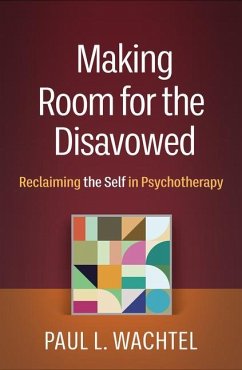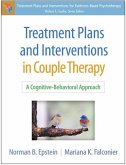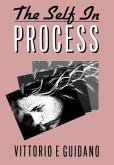- Gebundenes Buch
- Merkliste
- Auf die Merkliste
- Bewerten Bewerten
- Teilen
- Produkt teilen
- Produkterinnerung
- Produkterinnerung
In this uniquely integrative book, Paul L. Wachtel describes powerful clinical strategies to make roomfor aspects of the self that were sidetracked in the course of development.
Andere Kunden interessierten sich auch für
![Exposure Therapy for Anxiety Exposure Therapy for Anxiety]() Jonathan S AbramowitzExposure Therapy for Anxiety81,99 €
Jonathan S AbramowitzExposure Therapy for Anxiety81,99 €![The Anxiety and Worry Workbook The Anxiety and Worry Workbook]() David A ClarkThe Anxiety and Worry Workbook38,99 €
David A ClarkThe Anxiety and Worry Workbook38,99 €![Behavioral Activation for Depression Behavioral Activation for Depression]() Christopher R MartellBehavioral Activation for Depression59,99 €
Christopher R MartellBehavioral Activation for Depression59,99 €![Treatment Plans and Interventions in Couple Therapy Treatment Plans and Interventions in Couple Therapy]() Norman B EpsteinTreatment Plans and Interventions in Couple Therapy70,99 €
Norman B EpsteinTreatment Plans and Interventions in Couple Therapy70,99 €![Relational Theory and the Practice of Psychotherapy Relational Theory and the Practice of Psychotherapy]() Paul L WachtelRelational Theory and the Practice of Psychotherapy64,99 €
Paul L WachtelRelational Theory and the Practice of Psychotherapy64,99 €![Practitioner's Guide to the Alternative Model for Personality Disorders Practitioner's Guide to the Alternative Model for Personality Disorders]() Bo BachPractitioner's Guide to the Alternative Model for Personality Disorders71,99 €
Bo BachPractitioner's Guide to the Alternative Model for Personality Disorders71,99 €![The Self in Process The Self in Process]() Vittorio F GuidanoThe Self in Process49,99 €
Vittorio F GuidanoThe Self in Process49,99 €-
-
-
In this uniquely integrative book, Paul L. Wachtel describes powerful clinical strategies to make roomfor aspects of the self that were sidetracked in the course of development.
Produktdetails
- Produktdetails
- Verlag: Guilford Publications
- Seitenzahl: 336
- Erscheinungstermin: 5. September 2023
- Englisch
- Abmessung: 229mm x 152mm x 24mm
- Gewicht: 624g
- ISBN-13: 9781462553181
- ISBN-10: 1462553184
- Artikelnr.: 68105112
- Herstellerkennzeichnung
- Libri GmbH
- Europaallee 1
- 36244 Bad Hersfeld
- gpsr@libri.de
- Verlag: Guilford Publications
- Seitenzahl: 336
- Erscheinungstermin: 5. September 2023
- Englisch
- Abmessung: 229mm x 152mm x 24mm
- Gewicht: 624g
- ISBN-13: 9781462553181
- ISBN-10: 1462553184
- Artikelnr.: 68105112
- Herstellerkennzeichnung
- Libri GmbH
- Europaallee 1
- 36244 Bad Hersfeld
- gpsr@libri.de
Paul L. Wachtel, PhD, is Distinguished Professor in the Clinical Psychology Doctoral Program at The City College of New York. Dr. Wachtel has been a leading voice for integrative thinking in the human sciences and is a cofounder and past president of the Society for the Exploration of Psychotherapy Integration. He is a recipient of the Hans H. Strupp Memorial Award; the Distinguished Psychologist Award from Division 29 (Psychotherapy) of the American Psychological Association (APA); the Scholarship and Research Award from Division 39 (Psychoanalysis) of APA; and the Sidney J. Blatt Award for Outstanding Contributions to Psychotherapy, Scholarship, Education and Practice.
I. Introduction
1. Making Room for Thoughts and Feelings: Attachment, Self-Acceptance, and
Emotional Immediacy
2. Silos, Stereotypes, and the Evolutionary Links between Diverse and
Competing Approaches
3. What Is the Appropriate Evidence Base for Responsible Clinical Practice?
II. Beyond Pathologizing: The Dialectics of Acceptance and Change
4. From Interpreting Wishes and Feelings to Making Room for Them: The
Problem with Uncovering "the Truth"
5. The Roots of Pathologizing and Accusatory Interpretations
6. Anxiety, Exposure, and the Path to Self-Acceptance
7. Making Room in CBT: From Beck and Ellis to the Dialectics of Acceptance
and Change
III. Attachment and the Lifelong Dynamics of Development
8. Self-Acceptance and Self-Rejection: The Critical Impact of Attachment
9. Working in the Present on the Consequences of the Past
IV. Living-in-the-World
10. Experiencing, Emotional Immediacy, and Self-in-Action
11. Living in Contexts: From the Relational Matrix to the Impact of Culture
and Society
12. The Many Faces of Psychotherapy
References
Index
1. Making Room for Thoughts and Feelings: Attachment, Self-Acceptance, and
Emotional Immediacy
2. Silos, Stereotypes, and the Evolutionary Links between Diverse and
Competing Approaches
3. What Is the Appropriate Evidence Base for Responsible Clinical Practice?
II. Beyond Pathologizing: The Dialectics of Acceptance and Change
4. From Interpreting Wishes and Feelings to Making Room for Them: The
Problem with Uncovering "the Truth"
5. The Roots of Pathologizing and Accusatory Interpretations
6. Anxiety, Exposure, and the Path to Self-Acceptance
7. Making Room in CBT: From Beck and Ellis to the Dialectics of Acceptance
and Change
III. Attachment and the Lifelong Dynamics of Development
8. Self-Acceptance and Self-Rejection: The Critical Impact of Attachment
9. Working in the Present on the Consequences of the Past
IV. Living-in-the-World
10. Experiencing, Emotional Immediacy, and Self-in-Action
11. Living in Contexts: From the Relational Matrix to the Impact of Culture
and Society
12. The Many Faces of Psychotherapy
References
Index
I. Introduction
1. Making Room for Thoughts and Feelings: Attachment, Self-Acceptance, and
Emotional Immediacy
2. Silos, Stereotypes, and the Evolutionary Links between Diverse and
Competing Approaches
3. What Is the Appropriate Evidence Base for Responsible Clinical Practice?
II. Beyond Pathologizing: The Dialectics of Acceptance and Change
4. From Interpreting Wishes and Feelings to Making Room for Them: The
Problem with Uncovering "the Truth"
5. The Roots of Pathologizing and Accusatory Interpretations
6. Anxiety, Exposure, and the Path to Self-Acceptance
7. Making Room in CBT: From Beck and Ellis to the Dialectics of Acceptance
and Change
III. Attachment and the Lifelong Dynamics of Development
8. Self-Acceptance and Self-Rejection: The Critical Impact of Attachment
9. Working in the Present on the Consequences of the Past
IV. Living-in-the-World
10. Experiencing, Emotional Immediacy, and Self-in-Action
11. Living in Contexts: From the Relational Matrix to the Impact of Culture
and Society
12. The Many Faces of Psychotherapy
References
Index
1. Making Room for Thoughts and Feelings: Attachment, Self-Acceptance, and
Emotional Immediacy
2. Silos, Stereotypes, and the Evolutionary Links between Diverse and
Competing Approaches
3. What Is the Appropriate Evidence Base for Responsible Clinical Practice?
II. Beyond Pathologizing: The Dialectics of Acceptance and Change
4. From Interpreting Wishes and Feelings to Making Room for Them: The
Problem with Uncovering "the Truth"
5. The Roots of Pathologizing and Accusatory Interpretations
6. Anxiety, Exposure, and the Path to Self-Acceptance
7. Making Room in CBT: From Beck and Ellis to the Dialectics of Acceptance
and Change
III. Attachment and the Lifelong Dynamics of Development
8. Self-Acceptance and Self-Rejection: The Critical Impact of Attachment
9. Working in the Present on the Consequences of the Past
IV. Living-in-the-World
10. Experiencing, Emotional Immediacy, and Self-in-Action
11. Living in Contexts: From the Relational Matrix to the Impact of Culture
and Society
12. The Many Faces of Psychotherapy
References
Index








